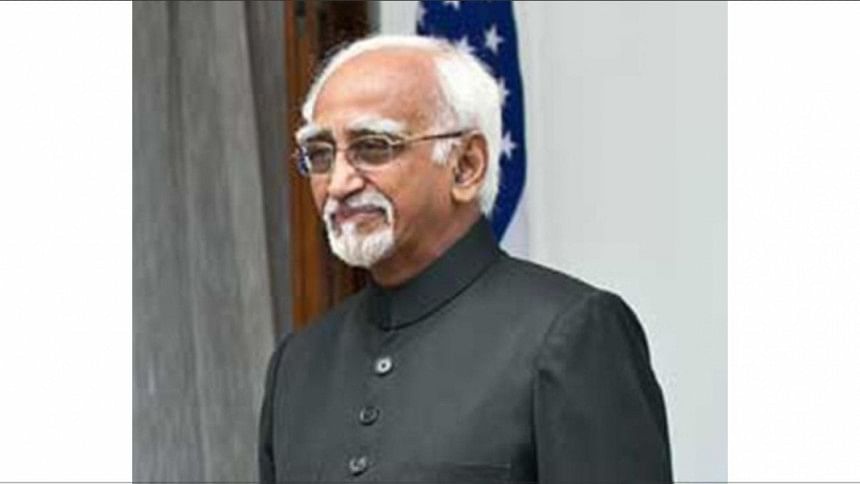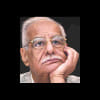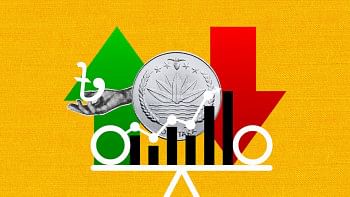What is the criteria for nominating Indian presidents?

Instead of building consensus behind the candidature of Hamid Ansari for president, the party has appointed its top three leaders to find a candidate who commands the consent of most political parties.
I cannot understand what is wrong with vice-president Ansari. He has handled the Rajya Sabha extremely well and before that, he made the Aligarh Muslim University a thriving academic institution during his tenure as the vice-chancellor. His erudition is beyond doubt and his commitment to secularism is without any blemish.
The non-BJP parties have come together to adopt vice-president Ansari, who is acceptable to all the other parties, as president. It would be embarrassing for him to be the opposition candidate when he is the country's vice-president. Dr Abdul Kalam, former president, was the popular choice of several opposition parties for a second term but had to face a similar predicament before pulling out. Thus, all that he got was the re-naming of Aurangzeb Road to Dr Abdul Kalam Road.
BJP is ultimately going to go with the choice of the RSS. It has indicated that it would keep in mind the secular ethos of the country, but the party is neither here nor there because when it comes to selecting a person for the top constitutional post, a Muslim candidate would be far from the thought of the RSS.
It would ultimately depend on Prime Minister Narendra Modi to nudge the party to choose a person of his choice. And the speeches made by BJP president Amit Shah, quite clearly indicated that the person thus chosen would be anybody but a Muslim. He has been touring the different parts of the country, including the southern states, and exhorting that the choice of a presidential candidate should be someone who is acceptable to the ruling party.
The two Houses of Parliament and the state legislatures, which comprise the Electoral College, suggest that the BJP will have its way. BJP's appointment of a three-member committee comprising Rajnath Singh, Arun Jaitley and Venkaiah Naidu - who are all members of Prime Minister Modi's cabinet - makes it clear that the party's top leadership will ultimately decide who should live in Rashtrapati Bhavan.
Speaker Sumitra Mahajan, who was initially supported by the ruling party, has been dropped. She is not being considered by either the DMK or the AIADMK. Understandably, the person has to be acceptable to the southern states like Andhra, Telangana, Karnataka, Tamil Nadu and Kerala.
It seemed like L.K. Advani could be BJP's preferred candidate for presidency. However, the court verdict on the Babri Masjid demolition could have forced the party to look elsewhere, as he has been charged as part of a conspiracy to destroy the Masjid.
If one were to look back, controversies between presidents and prime ministers have not been rare. Of the seven previous presidents, only Dr Zakir Husain and Fakhruddin Ali Ahmed left office without any public confrontation. Zakir Husain, who died in harness, confined himself to scholarly pursuits while Ahmed was one of the most pliable heads of state India ever had. It was during his tenure that the Emergency was declared and he signed the proclamation without verifying whether it had Cabinet approval or not.
Prime Minister Jawaharlal Nehru and Dr Rajendra Prasad had many constitutional run-ins. Dr S. Radhakrishnan had even succeeded in getting Defence Minister V.K. Krishna Menon sacked after India's debacle at the hands of the Chinese at the Sino-India war in 1962. In 1967, Radhakrishnan embarrassed the ruling Congress by allowing the Swatantra Party to parade its MLAs at Rashtrapati Bhavan to prove their majority in the Rajasthan Assembly.
Even V.V. Giri, a prominent trade unionist who was elected with the help of Mrs. Indira Gandhi - then Congress president - to the presidency, often expressed his reservations over anti-labour legislation. Thus, he objected when the Centre wanted to dismiss the striking railway employees. He also registered his protest over the supersession of Supreme Court judges.
Former acting president B.D. Jatti, who temporarily succeeded Giri, proved more assertive. When requested by the Janata government to sign the ordinance dissolving nine assemblies in states ruled by the Congress, Jatti stalled, pleading that the Centre had no powers to prematurely dissolve duly-elected Assemblies without proper reason. Then Prime Minister Morarji Desai was forced to hold out the threat of his resignation if Jatti delayed the ordinance and the Janata Party even organised angry demonstrations against the President.
Matters hardly improved even after the Janata Party chose Neelam Sanjiva Reddy as the country's president. Reddy and Desai could not get along and the latter prevented the president from going abroad even on ceremonial visits. Reddy, nursing a grouse against the Janata government, made constitutional history when he invited Charan Singh to form a government after Morarji Desai lost his majority in the Lok Sabha. Reddy set yet another precedent when he dissolved the Lok Sabha on the advice of a prime minister who could not prove his majority.
Even President Zail Singh installed Rajiv Gandhi soon after Mrs. Gandhi's assassination even before he was elected to the parliamentary party. It is another matter that both Zail Singh and Rajiv Gandhi were at loggerheads more often than not.
I wish Pranab Mukherjee had utilised his term to erase the memory of the decision which he took during the Emergency. He was apparently the right hand man of Sanjay Gandhi, an extra-constitutional authority. Hence, his name will not go down well in history. Like his predecessors, he too was mired in controversies, particularly when he published his autobiography while in office. He could have waited for his retirement to pen down his experience at Rashtrapati Bhavan.
Meanwhile, the present government at the centre must explain how secularism can survive when soft-Hindutva is spreading in the country. By elevating Ansari as President, the BJP would have assured the people that the country's ethos cannot go astray and no action will be taken that do not fit into the idea of India, which is a democratic and secular one.
The writer is an eminent Indian columnist.

 For all latest news, follow The Daily Star's Google News channel.
For all latest news, follow The Daily Star's Google News channel. 



Comments